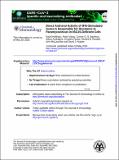Files in this item
Direct antiviral activity of interferon stimulated genes is responsible for resistance to paramyxoviruses in ISG15-deficient cells
Item metadata
| dc.contributor.author | Holthaus, David | |
| dc.contributor.author | Vasou, Andri | |
| dc.contributor.author | Bamford, Connor | |
| dc.contributor.author | Andrejeva, Jelena | |
| dc.contributor.author | Paulus, Christina | |
| dc.contributor.author | Randall, Richard Edward | |
| dc.contributor.author | McLauchlan, John | |
| dc.contributor.author | Hughes, David John | |
| dc.date.accessioned | 2020-05-29T11:30:03Z | |
| dc.date.available | 2020-05-29T11:30:03Z | |
| dc.date.issued | 2020-06-22 | |
| dc.identifier | 267631875 | |
| dc.identifier | 13c7d65c-a322-4fc4-9a7b-0ef91a54b8c4 | |
| dc.identifier | 32423918 | |
| dc.identifier | 000543320100025 | |
| dc.identifier | 85088395207 | |
| dc.identifier.citation | Holthaus , D , Vasou , A , Bamford , C , Andrejeva , J , Paulus , C , Randall , R E , McLauchlan , J & Hughes , D J 2020 , ' Direct antiviral activity of interferon stimulated genes is responsible for resistance to paramyxoviruses in ISG15-deficient cells ' , The Journal of Immunology . https://doi.org/10.4049/jimmunol.1901472 | en |
| dc.identifier.issn | 0022-1767 | |
| dc.identifier.other | ORCID: /0000-0002-9304-6678/work/74872888 | |
| dc.identifier.other | ORCID: /0000-0003-4051-4658/work/74873021 | |
| dc.identifier.other | ORCID: /0000-0002-0090-5710/work/74873054 | |
| dc.identifier.other | ORCID: /0000-0002-4123-5629/work/74873059 | |
| dc.identifier.uri | https://hdl.handle.net/10023/20010 | |
| dc.description | This work was supported by Academy of Medical Sciences Grant SBF003/1028, Wellcome Trust Grant 101788/Z/13/Z, U.K. Research and Innovation, Medical Research Council Grant MC_UU_12014/1, and Erasmus+ (to D.H.). | en |
| dc.description.abstract | IFNs, produced during viral infections, induce the expression of hundreds of IFN-stimulated genes (ISGs). Some ISGs have specific antiviral activity, whereas others regulate the cellular response. Besides functioning as an antiviral effector, ISG15 is a negative regulator of IFN signaling, and inherited ISG15 deficiency leads to autoinflammatory IFNopathies, in which individuals exhibit elevated ISG expression in the absence of pathogenic infection. We have recapitulated these effects in cultured human A549-ISG15−/− cells and (using A549-UBA7−/− cells) confirmed that posttranslational modification by ISG15 (ISGylation) is not required for regulation of the type I IFN response. ISG15-deficient cells pretreated with IFN-α were resistant to paramyxovirus infection. We also showed that IFN-α treatment of ISG15-deficient cells led to significant inhibition of global protein synthesis, leading us to ask whether resistance was due to the direct antiviral activity of ISGs or whether cells were nonpermissive because of translation defects. We took advantage of the knowledge that IFN-induced protein with tetratricopeptide repeats 1 (IFIT1) is the principal antiviral ISG for parainfluenza virus 5. Knockdown of IFIT1 restored parainfluenza virus 5 infection in IFN-α–pretreated, ISG15-deficient cells, confirming that resistance was due to the direct antiviral activity of the IFN response. However, resistance could be induced if cells were pretreated with IFN-α for longer times, presumably because of inhibition of protein synthesis. These data show that the cause of virus resistance is 2-fold; ISG15 deficiency leads to the early overexpression of specific antiviral ISGs, but the later response is dominated by an unanticipated, ISG15-dependent loss of translational control. | |
| dc.format.extent | 11 | |
| dc.format.extent | 1630275 | |
| dc.language.iso | eng | |
| dc.relation.ispartof | The Journal of Immunology | en |
| dc.subject | QH301 Biology | en |
| dc.subject | QR355 Virology | en |
| dc.subject | NDAS | en |
| dc.subject.lcc | QH301 | en |
| dc.subject.lcc | QR355 | en |
| dc.title | Direct antiviral activity of interferon stimulated genes is responsible for resistance to paramyxoviruses in ISG15-deficient cells | en |
| dc.type | Journal article | en |
| dc.contributor.sponsor | Academy of Medical Sciences | en |
| dc.contributor.sponsor | The Wellcome Trust | en |
| dc.contributor.institution | University of St Andrews. School of Biology | en |
| dc.contributor.institution | University of St Andrews. Biomedical Sciences Research Complex | en |
| dc.identifier.doi | https://doi.org/10.4049/jimmunol.1901472 | |
| dc.description.status | Peer reviewed | en |
| dc.date.embargoedUntil | 2020-05-18 | |
| dc.identifier.url | https://www.biorxiv.org/content/10.1101/2019.12.12.873919v2 | en |
| dc.identifier.grantnumber | SBF003/1028 | en |
| dc.identifier.grantnumber | 101788/Z/13/Z | en |
This item appears in the following Collection(s)
Items in the St Andrews Research Repository are protected by copyright, with all rights reserved, unless otherwise indicated.

